
Director/Screenwriter: Joss Whedon
By Roderick Heath
The Avengers could well be the most hyped movie ever made, surpassing the likes of Gone with the Wind (1939), Ben-Hur (1959), and other singular icons of globe-conquering audience awareness, if you consider that some of the predecessors in the series of Marvel Comics adaptations were basically teasers, primers, and set-ups for the cast of superheroes it features. The task of living up to such hype would be unenviable for any director, let alone one with only a single, middlingly successful feature to his credit, but the job of tethering together a dizzying sprawl of characters and plot gimmicks from other films into a single, grandiose bash-‘em-up finally fell to such a man: Joss Whedon.
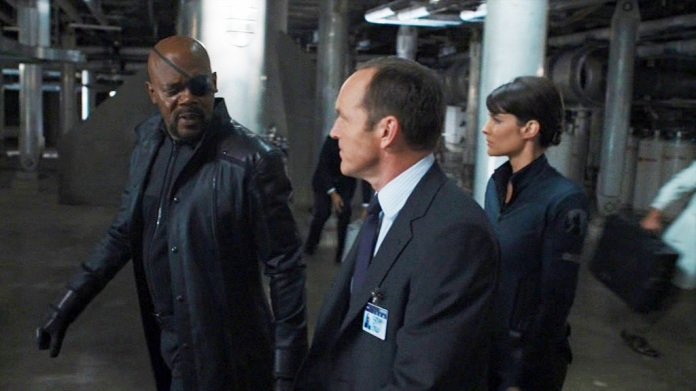
Whedon, who has long been known as the nerd’s nerd thanks to his engaging TV series Buffy The Vampire Slayer, Firefly, and Dollhouse, and stints writing storylines for some of the proper source comic books, inspires cultish devotion from many and an equal detestation from others. I confess to considering him rather a talent with great but hitherto unfulfilled potential. Whedon’s actual filmography is slight, having directed the cinematic conclusion for Firefly, Serenity (2005). Serenity suggested that Whedon’s talent for creating interesting characters in a stylised genre milieu, and witty, if occasionally gratingly arch, dialogue could be transferred to the compressed demands of a feature film, and that he could mount an exciting adventure story.
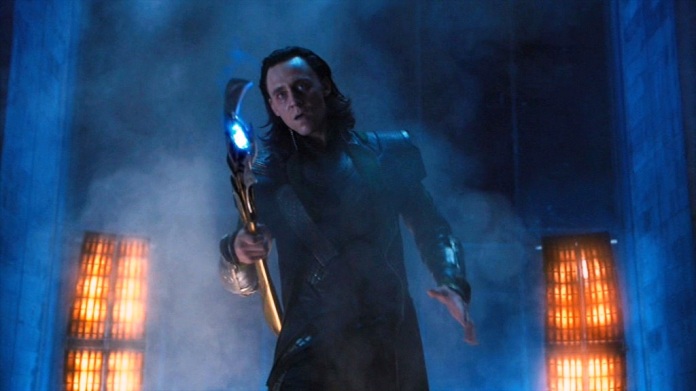
But it also frustrated with its lack of visual imagination and blandly TV-shaped sense of staging, and faltered in clarifying the whirl of storylines being resolved from the show for a new audience. Neither lack in Whedon’s touch was a good sign in approaching The Avengers. The first 20 minutes or so of The Avengers could be switchback-inducing for anyone who hasn’t watched the earlier Marvel films, Captain America: The First Avenger (2011) and ” target=”_blank” rel=”noopener”>Thor (2011) in particular, and, indeed, for those who didn’t wait through the end credits of those films to see their hidden kickers. Whedon also has to revive a rather different kind of film, one with deep roots in Hollywood but which has been fairly quiescent for a long time now: the all-star extravaganza, a form not simply defined by featuring a number of famous faces, but by having to sustain and balance them in parts that suit their aptitudes, fans, and dramatic necessity. Yes, this is the Grand Hotel of superhero flicks.

Thus The Avengers hits the ground running with Nick Fury (Samuel L. Jackson), director of the clandestine SHIELD security service, and scientist Eric Selvig (Stellan Skarsgard), trying to deal with the sudden coming to life of a powerful alien artefact, the Tesseract, which was retrieved along with the frozen Captain America from a watery Arctic grave. For a few minutes even I, who did watch those earlier movies, felt a little riled at such a headlong introduction, and the film takes a while to settle down, as it reintroduces the characters and sets the story into motion: because we already “know” the team, Whedon only goes through the motions of the Seven Samurai-esque gathering of the heroes. Loki (Tom Hiddleston), exiled brother of “god” Thor (Chris Hemsworth) and former usurping king of the alien realm of Asgard, has hooked up with a race of mysterious and very ugly extra-terrestrials who control a galaxy-crossing portal, and the Tesseract, as it happens, is the other end of that portal. Loki, having successfully sold the aliens on invading Earth and installing him as ruler, teleports into the SHIELD headquarters and takes psychic control of Selvig and Agent Clint Barton (Jeremy Renner), dubbed “Hawkeye” thanks to his awe-inspiring prowess with bow and arrow, and Fury fails to prevent the Tesseract’s theft by bringing down the headquarters about their ears. Fury, recognising that the sort of situation he’s been preparing for has arrived, calls in his sinuous superspy Natasha “Black Widow” Romanoff and sets about tracking down the various powerful weirdoes who will comprise his Avengers team.

Bruce “The Hulk” Banner (Mark Ruffalo) is tracked down to where he’s working as a medic in an Indian slum. Captain America, aka Steve Rogers (Chris Evans), is still trying to adjust to life in the new millennium. Tony “Iron Man” Stark (Robert Downey Jnr) has just built a New York skyscraper powered entirely by his miraculous arc reactor and resents being called away from the arms of his lover-assistant Pepper Potts (Gwyneth Paltrow). Thor is still apparently trapped on Asgard, having demolished the portal between the two worlds. Whedon’s rush of opening action betrays an uncertainty, perhaps inevitable, about how to get this contraption off the ground: still, I don’t think David Lean could have taken on such a burden and managed to make it flow perfectly. The opening offers a little tough-gal action with Cobie Smulders as Maria Hill, a cool and sturdy SHIELD agent who continues to bob up distractingly throughout the rest of the film, but whilst Whedon does snap into focus, unsurprisingly, when he can focus on a kick-ass female hero, it is in this case Johansson, who, after enlivening the torturous Iron Man 2 (2010), maintains her form as Natasha in a droll introduction. In the middle of being tortured by sleazy Slavic arms dealers, Agent Coulson (Clark Gregg) calls Natasha’s mobile phone and she irritably resists having her mission cancelled now that the “interrogators” are inadvertently telling her everything she needs to know, but, obediently, she clobbers her captors whilst still tied to a chair and makes her escape. She is sent to track down Banner, whose Hulk alter ego, although he’s been keeping a lid on it successfully of late, is regarded as an unreasonable danger; it’s Banner’s scientific knowledge SHIELD wants.
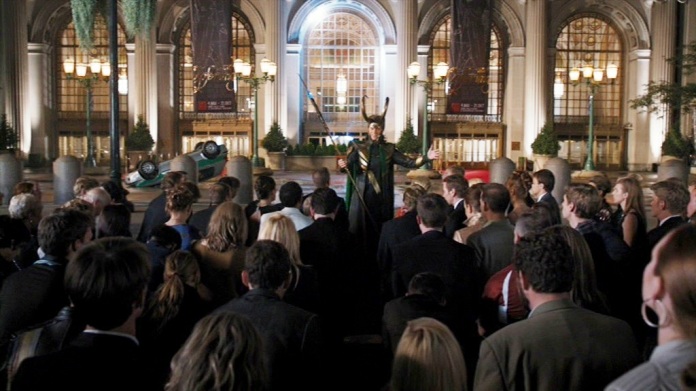
Ruffalo, taking over a seemingly cursed role after Eric Bana and Edward Norton, far outshines them for grasping Banner’s essence, not having the physical presence of Bana and more convincingly anxious than Norton; he instead pitches his performance as a savant gnawed at by the beast within, his skin sallow and his soul seeming to droop nearly as much as his purposefully oversized wardrobe, and so the Hulk stands as the Most Improved Superhero in this movie. Loki makes his presence known in Stuttgart, Germany, where he tries to browbeat a crowd into kneeling before him, only for an old man (Kenneth Tigar), having seen all this before, to resist. Before Loki can blast him away, Captain America arrives to block the exterminating bolt with his shield: he too has seen this sort of thing before. Such a scene is a punchy reminder that Whedon grasps not only the essence of good melodrama but also the powerful underlying thematic ties of this material to the anxieties of the last century. Whereas Stark’s Iron Man, who arrives to give Rogers some needed aid, constantly trails the association of the Cold War his father fought and the American hegemony and embodies the cognitive dissonance of this age, Rogers is still the WW2 fascist-fighter, and recognises Loki’s übermensch mentality. Interestingly, as the least colourful and the most old-fashioned of the heroes, Rogers emerges as the film’s axiom, all the more surprising as Captain America was saddled with the least inspired of introduction films. But Rogers’ air of faintly forlorn, antiquated idealism is compelling as Fury states apologetically that “we’ve made mistakes…some very recently”, and inevitably grazes against the post-modern wise-assed diva act of Stark.

Evans, a surprisingly restrained and grounded actor considering that he first came to attention playing the insufferable Johnny Storm in the Fantastic Four movies, absorbs Downey’s stream of flip with a shield of earnestness far more impressive than the metallic one he carries. Whedon aptly makes Coulson a closet Captain America fanboy, and wants his childhood hero to sign the trading cards he’s collected. Rogers offers Whedon an obvious avatar for exploring not simply the boyish fantasies at the heart of the superhero mythology, but also the powerful pull of nostalgia, and the sense of being a devotee to any creation with a legacy, not just seventy-year-old comic book heroes, which means living both in the past and the present. Rogers searches for something, anything, to give him purpose and direction: when, having sat through a stream of modern techno and military babble, someone’s crack about “flying monkeys” makes him shout with joy that he recognises the reference. Rogers however instantly adapts to crisis situations, and emerges in the finale as the team’s natural leader, as an experienced soldier and strategist, barking out a stream of instructions to the team to take up positions, ending with the immortal last order to his least sophisticated warrior: “Hulk…smash!” That said, Downey, so beleaguered in Iron Man 2, is in fine form here, especially as he mocks Thor’s initial appearance as “Shakespeare in the park,” (“Doth your mother know that you weareth her drapes?”) and later dubbing him “Point Break”, and, surprised to recognise in Banner a fellow genius, taking pause to praise him for his work, including turning into an “enormous green rage monster.”
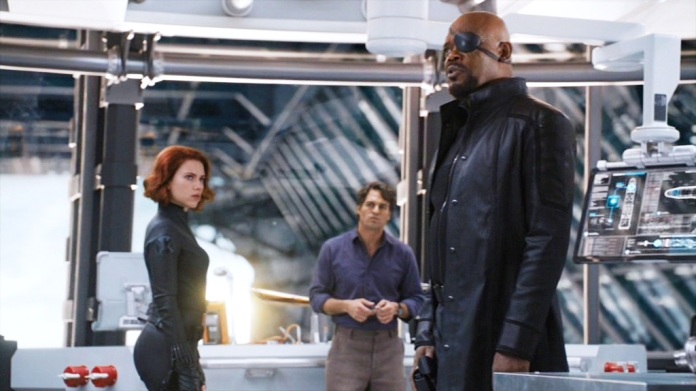
Hemsworth’s Thor, still charmingly arcane in speech and unsubtle in method, arrives trailing fraternal issues, and makes several ill-advised attempts to talk his brother into ending his campaign of violence. Loki’s familial status is key to one of the film’s funniest lines, as Thor demands respect for the villain from the humans because he’s part of the Asgard royalty: when Natasha points out he’s killed eighty people, Thor can only bleat, “He’s adopted.” Whilst it would be easy to make The Avengers sound like a stream of Whedon-speak, the erstwhile writer-director actually for the most part contours his style into the material, which demands a more consistently classical sense of weight than Whedon’s usual pitch offers, with success. Somehow, he manages to squeeze in the great Polish director Jerzy Skolimowski, an early sign that Whedon’s aiming higher than usual, as the leader of the baddies Natasha bests at the start, and Jenny Agutter and Harry Dean Stanton also make some wryly stirring cameos for the movie fan with more than the goldfish memory of current pop culture. The Avengers takes some time to find its groove, in part because there’s so much going on, usually the opposite problem to what comic book adaptations have to deal with, and Whedon’s experience at smoothly drawing together story elements as an audio-visual as well as literary entity still isn’t that strong. Whedon instead feels his way along through what is for him the much more comfortable device of making The Avengers, in essence, a TV episode about forty minutes long, getting his characters into a small space, in this case on SHIELD’s amusing new command base, an aircraft carrier that turns into a near-invisible flying fortress, and listening to them argue, snipe, quip, cajole, threaten, butt heads, and bond. Rather than hurting the film, this segment gives the film its traction and the vitally needed human element, as Whedon carefully exposes the raw nerves of the team, their isolation, traumas, guilty legacies, and potential weakness. This puts The Avengers unshakeably on track for the first of the film’s two genuinely epic-scaled action sequences.

Before they start working as a team, in time honoured tradition the heroes clash incessantly, even violently, as they first come into close proximity, as when Thor first appears on the scene, manifesting on the back of a plane and snatching the captured Loki away from Stark and Rogers, sparking a forest-levelling tussle between the demi-god and the mechanical man, which finally the thawed-out ‘40s square has to quell like a teacher interrupting a schoolyard brawl. Later, as it turns out that Loki is plotting to destroy the Avengers before they even really get going by exploiting their fractiousness and unleashing the supposedly uncontrollable Hulk, Hulk rampages first after Natasha, who, although tough as nails, finishes up a quivering foetal ball in hiding at the spectacle of the green monster, and Thor finishes up having to take him in a ship-shaking brawl. In terms of story structure and imagery, it wouldn’t be too inaccurate to call The Avengers a cross between The League of Extraordinary Gentlemen (2003) and Sky Captain and the World of Tomorrow (2004). Like the former, there’s a team of famous if conflicted and volatile personalities drawn together to fight a nefarious villain, and they initially prove their mettle by saving a super-futuristic craft from sabotage, a craft which looks like something out of the latter movie, as do the flying alien invaders they take on in the finale. Perhaps that merely reflects the relatively limited lexicon of the supposedly endless permutations of such fantasy material. It does however behove me to point out that Whedon’s film does everything bigger and, more importantly, better: better detail, better effects, better characterisation, better drama.
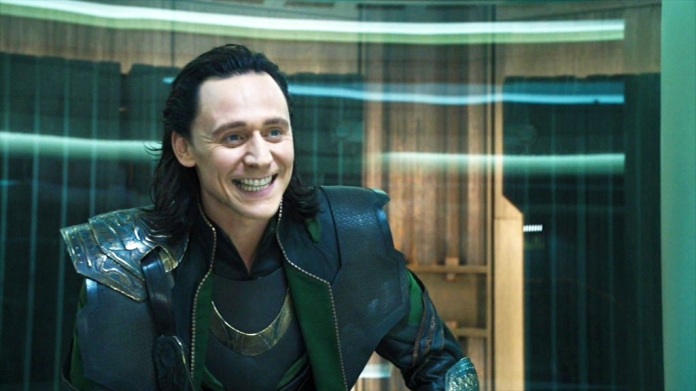
Most vitally, Whedon knows that this sort of tale has to reach a moment of iconic power where the heroes click as a team, and he offers this as the heroes gather in a circle with their enemies about them, but also that the heroes have to all have their distinctive moment of glory, which requires coherence in the style and saves the finale from being a singular mass of tedious action. And everyone gets one, from Natasha pulling off an astounding hijack of an alien flying craft thanks to her gymnastic skills, to the Hulk, irritated by Loki’s mockery, grasping him and slapping him about like a rag, finally reducing the sneering hunk of malevolence to a groaning wreck in a moment that could well come out of a Chuck Jones Looney Tunes cartoon. Loki isn’t as interesting a villain as he was in Kenneth Branagh’s terrific Thor, where his pathos and pathetic neediness underscored his treachery; now he’s a mad and unrepentant would-be dictator, but Hiddleston still serves him well, playing him as the most vicious English boarding school bully imaginable, with a strut archer than Ziggie Stardust-era Bowie and a nice line in antique insults. Renner has the most thankless task in the film, playing the one team member who hasn’t had a substantial prior introduction, and he spends half of it under Loki’s mind control to boot. Hints of his and Natasha’s connection through a personal debt and perhaps, although she denies it, something deeper, does nonetheless clear the way for some emotional urgency in Hawkeye’s return to the fold. Renner projects the same taciturn sensibility of a warrior wit honed to the finest edge that caught the eye in The Hurt Locker (2008), with an added hint of reserved gallantry: thus Hawkeye seems, in his way, the most “real” character in the film.
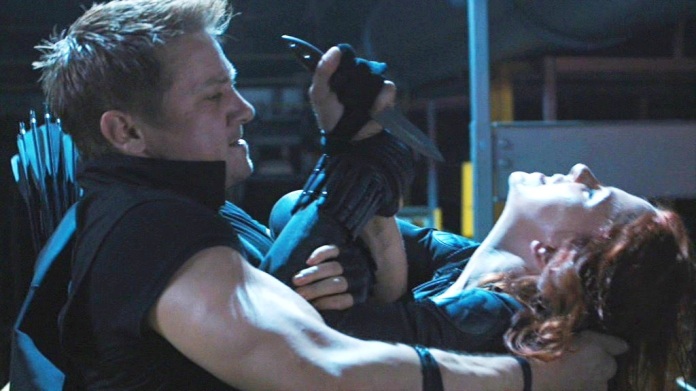
Of course, whilst the outlay of story elements is busy, the actual plot, once in motion, is actually very simple, even scanty, an excuse to give the Avengers a decent threat to go up against – not always an element these films remember to provide, as Superman Returns (2006) sadly forgot. The real stress is on character conflict, and Whedon smartly makes this the essence of Loki’s plans as well as the general story dynamic: he pricks the heroes, especially Natasha, with their own hang-ups, in his attempts to divide and conquer. The team comes close to disintegrating when they learn Fury and SHIELD have been trying to create new weapons with the Tasseract’s power, the act which alerted the aliens to its presence in the first place. But when Coulson is fatally wounded by Loki, Fury gives them a little propagandist push by soaking Coulson’s trading cards in his blood and presenting them to the team as a spur, an interesting stab at trying to complicate the film’s morality, and consider how such spurs can be both manipulative and dishonest, but perhaps sometimes also necessary. Fury himself has to defy unscrupulous masters in trying to hold off a shadow World Security Council from using the nuclear option on Manhattan, something he fails in, demanding a final sacrificial effort from Stark. On a purely incidental level, it’s cool to see Jackson’s Fury finally get to do some proper badass work, and I kind of wish someone would make a “Young Nick Fury” movie: surely there’s room for a black superhero with ‘70s Blaxploitation motifs in his background and atomic-age power in his hands in the modern pantheon.
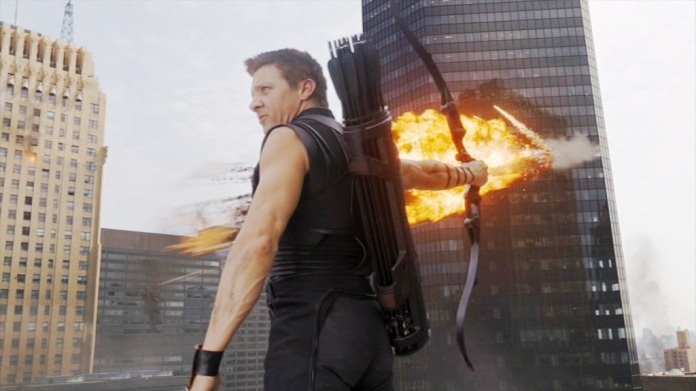
When it comes to the crunch, The Avengers provides a properly spectacular and visually well-organised special effects extravaganza, in production terms one of the best ever done, staged with ebullient energy: it’s certainly trying to be such, although it can’t reach the level of imperative Peter Jackson managed in The Lord of the Rings: Return of the King (2003), where there’s a dizzying sensation in the action of multiple elements long in the setting up colliding head on, or the finale of George Lucas’ Star Wars: Episode III – The Revenge of the Sith (2005), where the settings and the effects ebulliently describe the emotions being enacted. This is more spectacle for spectacle’s sake, turning a basic punch-up into something like three-dimensional chess using a city as a playing board, but damn, what spectacle. Whedon, or at least the special effects team provided him, invokes the dreaded Transformers movies at points, especially as the final battle in a cityscape superficially resembles the climax of the first of Michael Bay’s series. The always unpleasant sensation Bay’s films radiate, with their unreconstructed militarist fetishism and sense-contorting editing styles, has been seen by many as transmitting a kind of covert fascism; Whedon answers this by not simply emphasising democratic themes in his tale, but by making his film entirely fluent and thrilling through access, not assault, for eye and mind. I don’t know if it can yet be said that Whedon has any kind of definable visual style, but he does have a fondness for long-take sequences as a way of facilitating that democratic spirit, and this strategy culminates in one utterly bravura shot that seems to move along the breadth of Manhattan, finding each of his individualist heroes engaged in their station of battle in a fashion that unites them strategically and emotionally, from Captain America brawling on street level to Hawkeye atop a skyscraper to Thor and the Hulk riding the back of one of the grotesque mechanical leviathans the aliens employ.
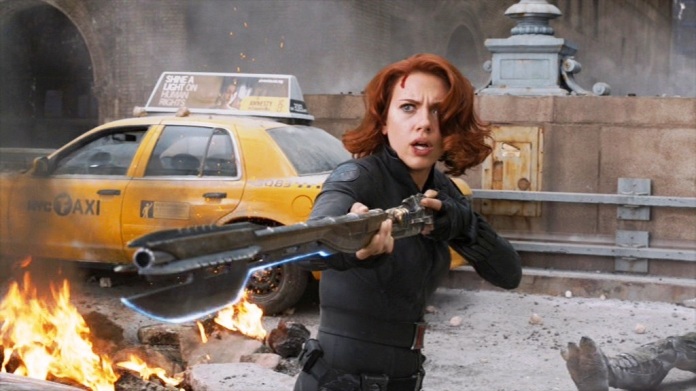
The sight of Thor’s red cape swirling as he rides a colossal beast of dull grey steel over the equally dull grey New York skyline catches the eye like the essence of some secret genre poetry, in which both fantastic invaders and familiar urban architecture are equally complicit in a war against the unrelieved colour and power of the primal individual, and both lose big time. Whedon shoots for some of the supercharged emotion glimpsed once upon a time in the climaxes of the early Superman films or Star Trek: The Wrath of Khan (1982) as Stark tries to call an oblivious Pepper for a goodbye as he prepares to sacrifice himself for humankind, an act Rogers earlier said he could never consider: Whedon doesn’t quite hit those heights, but it’s nice that he tried. Some touches do become repetitive, especially characters falling from great heights for bruising landings, but all in all this is a brilliantly made sequence that dwarfs almost all rivals. The Avengers doesn’t escape all the familiar blind spots of this kind of filmmaking. In addition to the stuttering start, it sadly forgets to include a satisfying ending where the characters have a proper farewell, there’s a tacked on promise for another sequel, and a certain amount of fragmentation sets in with Whedon’s need to keep all his elements in some sort of focus.
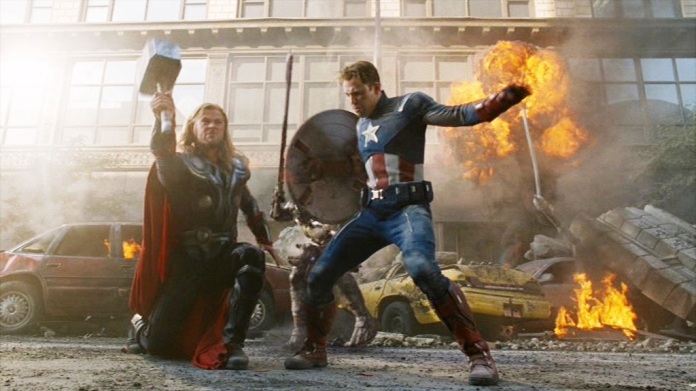
There’s a constant, uncomfortable reminder with these Marvel movies that they can never just be movies sufficient unto themselves. Romance is mere theory, and sexuality is expressed through the tight pants of its heroines. It’s these lacks that repeatedly stand in the way of the superhero genre truly becoming the heir of the swashbuckler, which was always defined not only by its basis in the immediate reality of the athleticism of its actors, but also by the incision of personal concerns that are definably adult – looking forward to the future, trying to reproduce, and reshape nominal barriers of gender and class to find a place in a society worth living in – rather than the kind of pouting angst, detached from such concerns, so often found in modern superheroes and which makes them so relatable for teens; the reasonably strong romantic element of Thor was one reason it stood head and shoulders above most of the recent pack, and Tony Stark’s former playful licentiousness is down for the count. But it feels a bit churlish to stress such lacks considering that The Avengers as a whole really does hit the mark as surely as one of Hawkeye’s arrows. It has to be said that between this and the fiscally ill-fated but still glorious John Carter, 2012 has seen the blockbuster bar raised pretty darn high for the next few years.

Seems odd that this has opened everywhere but the US so far (41,000 votes at IMDB), very unusual for a big blockbuster, so I can’t read your review yet – well, don’t want to. I did read the last couple of sentences, sounds like a good movie.
LikeLike
Patrick, it’s not that unusual at least in my neck of the woods because there’s a big tourist-frequented IMAX theater a relatively short train trip away from where I live, and big movies often open there a hair before the US. But yeah, this time the international release really does some to have hit generally before the US release, which is interesting. Perhaps someone paid attention to how much money John Carter made internationally and decided to build up a head of steam.
LikeLike
Hey Rod,
This comment actually has nothing to do with “The Avengers.” This question is probably better suited to e-mail, but I couldn’t find an e-mail address on your site (which I read frequently and enjoy, by the way). I am US resident who applied to graduate film schools here and didn’t get in, which is irritating because I am passionate about film and felt that I submitted a good portfolio.
I am now looking to do graduate film studies in Melbourne at RMIT or Victorian College of the Arts. As I understand it from listening to the filmspotting podcast and other sources, Melbourne has a very strong community of film lovers. Also, I have some family there. What is your opinion as a fellow cinephile and resident of Australia?
LikeLike
“Hath the heroes no sexualized tight pants?” he asked, his eye having lit upon a random vivid line.
LikeLike
Funny. I was just explaining the many reasons some films will open elsewhere (than US) before seeing an international release. Aside from that – great article. I didn’t read it at all (spoilers) but totally dig the pics, and will be back to read it once I get to see the movie first. But I know the post will be great!
LikeLike
Chris: Ha! Not quite as tight, nor given quite as lingering from-behind shots, from my not particularly attentive observations. Of course, no-one has tighter pants than the Hulk, but I don’t think anyone’s interested in his bunched-up package. I may be wrong.
Zack: have a blast. I would say that I don’t think my post is too spoilery; really in fact it’s designed to whet the appetite. I can’t take credit for the pics; they’re culled from every corner of the internet.
Tarun: hello and thanks for asking. My knowledge of the Melbourne film scene is not first-hand, but that said yes, Melbourne’s film community is famously strong, and whilst I know nothing about the VMIT’s reputation, I do know that the Victorian College of the Arts has a good reputation for its film department: I was once briefly working with a graduate who had made an impressive thesis film there, so as far as that goes, VCA has what you’re looking for, although it’s probably not the only place.
LikeLike
Yes I quite agree it is one of the most hyped movies ever, and I have a bunch of kids in this house that have been doing their own kind of impatient promotion, making me promise to see it this coming weekend. Methinks this is basically a mixed review, and if I had to wager on my own ultimate reaction, I’d say I would probably wind up agreeing. But the proof will be in the pudding. The film played on Tribeca on the final day in advance of it’s wider opening tomorrow, but I was too busy seeing a number of other films during that time, knowing full well I had the kids to answer to.
LikeLike
No Sam, I’d say this is a very positive review that does mention some flaws. But have a blast with the kids!
LikeLike
Very nice review, Rod. I couldn’t agree more with your thoughts on how Banner/Hulk was portrayed. Easily the best of any of the films he’s been in. Not only was the CGI good but Ruffalo nailed the character of Banner. I also thought it interesting how Whedon portrayed the first Hulk-out as some kind of scary monster in the way he goes after Black Widow and her subsequent traumatization was well-played. He didn’t dwell on it for long but enough to show the darker aspects of the Hulk.
Also enjoyed the witty banter between superheroes, a staple of the comic books but something that doesn’t always come across in the film versions. Whedon knows how it works and fortunately he has the cast that can handle it.
I also like that he provided Loki with personal motivation for doing what he does in the film. Too often in these kinds of films the villain is in it just destroy the world or take it over but in this one Loki is on a vengeance trip for slights he received in THOR. It gives his character some substance. And on the other side, I like how the stakes keep rising for our heroes. Not only do they have to save the world but it is also personal for them after Coulson’s demise. There is something tangible for them (and for us) to hold onto as they go into battle.
I also liked how the final battle was a bit of nail biter. Sure, you know how it’s going to end but dammit, I still found myself caught up in the tension as the alien waves kept coming in on our heroes and how they got more tired as the battle went on. That was a nice touch, I thought.
LikeLike
Oh, thank god, a comment from someone who’s seen it at last. JD, I too liked the heroes getting tired and hurt in the finale, and I think Whedon should’ve taken it further. The battle was terrific in general, though. Actually, it didn’t occur to me until after I’d written this review that the film is essentially a supersized version of Buffy‘s fifth season finale. The monstrous edge of the Hulk is indeed intelligent; finally, someone seems to have captured the ferocity of the character in a fashion that’s immediate and doesn’t feel irritatingly laboured as in the first two. Coulson’s death was effective, but it was very predictable – of all the people bound to get knocked off, he was the one, and Whedon is ever-canny in knowing who to kill; frankly it didn’t really count as much for me as the simple spectacle of the heroes overcoming their doubts in themselves and of each-other. Loki definitely is a great villain, but as I said, I found him subtler and more original in Thor.
LikeLike
“the film is essentially a supersized version of Buffy‘s fifth season finale. ”
Good call! I had thought about that while thinking about the film afterwards. Also, you see this kind of last ditch defending against impossible odds in the series finale of ANGEL and actually at the end of SERENITY as well.
I don’t think Whedon could’ve really taken the finale any further or more extreme without killing off one of the super heroes and obviously Marvel would never have let that happen so I think he did what he could within the confines he had to work with.
Agreed about Coulson’s death but it was effective. I also found it interesting how Fury used it to manipulate the Avengers. Whedon did a nice job of playing up the dirtier/shadier aspects of SHIELD and by extension the US government, esp. sending the nuke, which certainly upped the intensity in that last battle.
Y’know, I still have to see THOR but based on Loki in this film… and actually Hemsworth’s performance as Thor in this film it has me intrigued to see it.
And on a purely comic book fan level, let me say how cool it was to see Thanos set up as a possible future villain.
LikeLike
Yes, indeed, it was the way Whedon tweaked the way Coulson’s death worked, making it almost a meta moment in alerting us to the use of violent death as an excuse for outrage, that was one of the film’s most intelligent moments. And the low-bubbling cynicism over the SHIELD and other institutions, again very Whedon, carried a consistent whiff of political meaning, especially after Fury’s “we’ve made mistakes” line.
I didn’t necessarily mean a the finale needed another death, just I think some touches like Thor’s pain after getting stabbed by Loki, et cetera, should have added up more. Superheroes fighting supervillains are allowed to get puffed out and mangled.
Check out Thor; I loved it, and found it the best of the Marvel films by a vast margin prior to this, although it’s much less of an action-driven film; it’s rather based in a rather old-fashioned sense of spectacle in design. Both Hemsworth and Hiddleston are excellent in it and being as it is a film about their characters, they get to do a lot more shading.
LikeLike
Your comments re: THOR certainly have me intrigued. Plus, it has Natalie Portman and Kat Dennings in it, which doesn’t hurt. I will definitely have to check it out.
I understand where you’re coming from re: the finale. Yeah, I could see Whedon trying to do that with Iron Man almost taking one for the team. He really took a beating in that battle, which was interesting to see.
LikeLike
“No Sam, I’d say this is a very positive review that does mention some flaws. But have a blast with the kids!.”
That’s too bad Rod, as it turns out I wish it would have been severely mixed. I found this soulless pyrotehnic mess, torturous to sit through, an endless parade of the same old mind-crunching noisy hysteria that has maligned our screens through most of this superhero madness. No character development (except perhaps a bit for Ruffalo) and nothing but an encore of what we have seen before. THE HUNGER GAMES is CITIZEN KANE next to this one. At least Ross’s movie has a pulse.
I know, the response here if there is even a response will be quite nasty, but in view of the venom I spewed forth I can take it. I know the film has many fans, has received mostly very strong reviews, and even has some support in my own family, but I’m just not there. I’d say my two oldest boys did have a blast.
Fair enough.
LikeLike